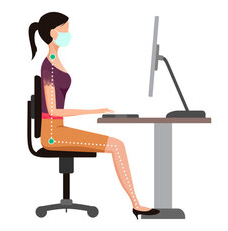Working From Home – Hybrid or Full Time
Navigation for employers and employees.
At the beginning of the COVID-19 pandemic The Health & Safety Executive (HSE) used the terminology ‘temporary’ in their guidance, for anyone forced to work from home.
Crucially, by using the word temporary, this meant that employers didn’t have to provide desks or chairs but only display screen equipment (i.e. keyboard/mouse/pc/laptop) while working from home. The downside to this… well, working from dining room tables and chairs will have no doubt caused body aches and pains for those employees.
When the UK roadmap restrictions lifted on 19th July 2021 some employees were no longer asked to work from home. However, many businesses have adopted a ‘Hybrid’ working method, whereby they don’t have to work in the office every day but to only commute to the office for meetings or tasks as and when required to.
Why am I highlighting these points?
Well, employers have a duty of care to protect employees, aligned with HSE policy. No longer should you be forced to work from dining/kitchen tables and chairs… but from what we know, many people still are and now will be again!
To quote the HSE from this link https://www.hse.gov.uk/toolbox/workers/home.htm
What your employer ‘must do’
“As an employer, you have the same health and safety responsibilities for home workers as for any other workers.
When someone is working from home, permanently or temporarily, as an employer you should consider:
- How will you keep in touch with them?
- What work activity will they be doing (and for how long)?
- Can it be done safely?
- Do you need to put control measures in place to protect them?”
In our opinion and interpretation, this advice clearly suggests that office chairs and desks should be provided.
However, in the same thread is where the muddled and somewhat misleading guidance becomes confusing. It states:
“Specialised DSE equipment needs
Employers should try to meet those needs where possible.
- For some equipment (eg keyboards, mouse, riser) this could mean allowing workers to take this equipment home.
- For other larger items (eg ergonomic chairs, height-adjustable desks) encourage workers to try other ways of creating a comfortable working environment (eg supporting cushions).”
“Should try” please… really? So, if you don’t try to meet those needs it’s, ok? What a bizarre statement. Not to mention trying a “supporting cushion” … that should cut it, right?
It gets better... to quote again:
“There are some simple steps people can take to reduce the risks from display screen work:
- breaking up long spells of DSE work with rest breaks (at least 5 minutes every hour) or changes in activity
- avoiding awkward, static postures by regularly changing position
- getting up and moving or doing stretching exercises
- avoiding eye fatigue by changing focus or blinking from time to time”
Blinking... what is this new phenomenon? This will really help with my posture, health, and well-being!
Enough regurgitating quotes now… what next?
Well... The Chartered Institute of Ergonomics and Human Factors has published this infographic https://www.ergonomics.org.uk/common/Uploaded%20files/Publications/CIEHF-Working-from-Home-Infographic.pdf
You’ll see all the standard workplace guidance for Home Working and Staying Healthy. Within this document, you’ll see some useful tips and help to set up your workstation correctly and where you don’t have access to fit and proper workstations… however, this is the main reason for publishing this blog. You should have access to fit and proper workstations if you’re still working from home or have now been asked to work from home, full time.
We ask employers, have you or your employees experienced any neck, shoulder, or back pain since being told or chosen to work from home?
If the answer is yes, then get in touch with UK Ergonomics. If the answer is no but want to protect your employees by future proofing these ailments.
We can help with DSE Workplace Assessments and make recommendations for correct equipment, such as ergonomic chairs and height adjustable desks.
Call us on 0151 315 0988 or email sales@ukergonomics.com

